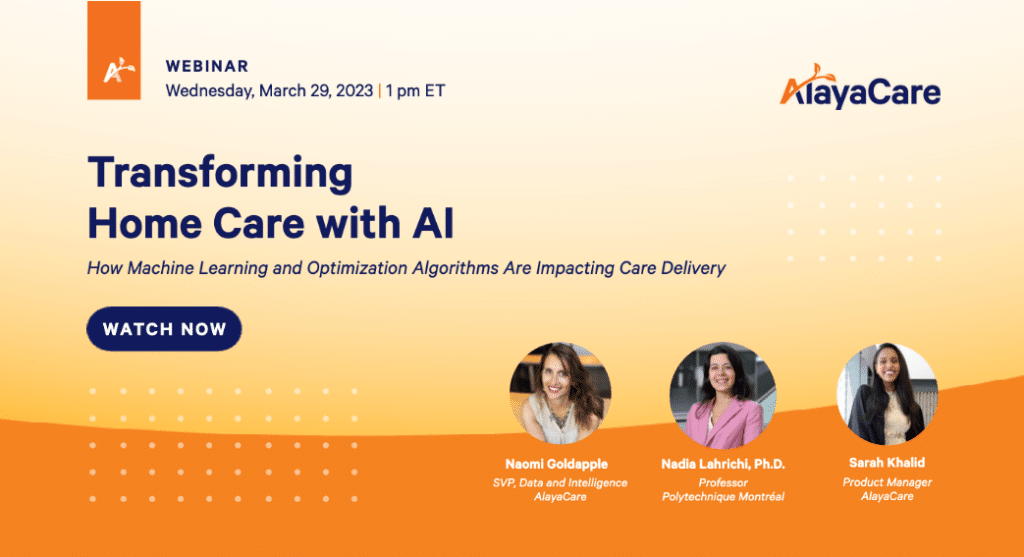Blog
Embracing evolution: 4 ways AI and automation are driving change in home care

Artificial Intelligence (AI) and automation are dramatically altering the landscape of the home care industry. This innovative technology is not just a buzzword; they are powerful tools that enhance efficiency, revolutionize operations, and significantly improve client care.
But let’s get back to basics first…what is the difference between AI and automation? Do they work together? Or are they separate?
These may be the biggest words to float around the industry today, but not everyone in home care is tech savvy enough to understand them and what they mean for their home care organization.
AI basically is the collection of different technologies that allow the machine to act at the human level of intelligence. This means it can process required learning from past experiences and self-correction to make a certain decision and to reach a certain conclusion.
Whereas automation is designed as something which runs itself with little or no human interaction by some specific patterns and rules to perform repetitive tasks. This means it is like a pre-set and self-running system to perform specific routine tasks, just like how an automatic car shifts gears automatically when you drive at certain speeds.
Yes, they can work together! An automated system collects data while it does a repetitive task, and an AI system can use that data to make predictions and new processes1.
Let’s explore 4 key ways AI and automation are making a significant impact…
1. Predictive health analytics
Machine learning algorithms can comb through vast amounts of client data to identify patterns and predict potential health risks. This predictive ability is transformative for the home care industry, enabling a shift from reactive to proactive care.
Without these, home care agencies relied on manual processes that were often reactive rather than preventive. Recognizing problems typically happened after they had become acute, makes management more challenging and less effective. For example, a study on machine learning conducted by AlayaCare found that with the help of machine learning, care workers were able to significantly improve event predictions, while reducing over-diagnosis by 54%. Using AI for predictive health analytics effectively reduces the likelihood of severe health issues that lead to hospital readmissions by enabling early intervention.
2. Operational efficiency
Automating administrative tasks such as scheduling, billing, and record-keeping allows office staff to devote more of their time and energy to delivering high-quality care. This leads to increased accuracy, minimizing errors that can result in billing issues or inaccuracies in client records. Also, it boosts productivity by enabling staff to accomplish more in less time.
Hear Privatus Care Solutions’ story about how they saved 10+ accounting hours monthly when they implemented automation tools into their day-to-day processes:
With automation taking over routine administrative tasks, office staff can focus on more critical aspects of care delivery. This shift has resulted in improved client outcomes, as caregivers can spend more time interacting with clients and less time on paperwork.
Transitioning to automated processes does require an investment in training and infrastructure. However, the resultant increase in operational efficiency, coupled with improved client outcomes, makes this a worthwhile investment for home care agencies.
3. Enhanced communication
As we’ve discussed so far, automated processes can support efficiencies in many areas of home care. These efficiencies with automation can also help facilitate seamless real-time communication between caregivers, clients, and their families. Automation software can instantly transmit critical information such as health updates, medication schedules, and changes in condition. This means no more waiting for phone calls or emails – information is shared immediately and accurately.
It allows information to constantly stay up to date in real-time ensuring everyone in the client’s circle of care stays in the know about the client’s progress. With manual processes, there can be challenges like delayed updates, miscommunication, and information gaps that could potentially affect a client’s well-being. It also fosters trust and transparency between the caregiver, client, and family, making the caregiving process more collaborative and efficient.
Agencies had to rely on slower, more error-prone methods of communication, like manual record-keeping and verbal updates. The introduction of AI into the home care industry has truly marked a new era of enhanced communication. Embrace this change today and experience the difference.
4. Optimized visits
Automation has been a game-changer for efficient scheduling within the home care industry. Prior to their introduction, agencies struggled with manual scheduling and routing, which often led to inefficiencies, wasted resources, and sub-optimal client care. Recently, advanced algorithms (advanced algorithms build upon basic ones and use new ideas) have been added to the mix by optimizing the automated scheduling and routing for caregivers by considering factors like travel time, caregiver skills, and client needs.
These new optimized scheduling tools, like AlayaCare’s Visit Optimizer, now streamline this process by automatically generating the most efficient schedules and routes, ensuring that the right caregiver reaches the right client at the right time.
The benefits of such optimized visits are impressive! For example,
- It reduces unnecessary travel time and costs.
- It ensures that caregivers’ skills are matched appropriately with client needs, leading to better care outcomes.
- It allows for more visits within the same timeframe, thereby increasing the agency’s capacity to serve more clients.
With advanced algorithms and automation working together, the home care industry can now deliver efficient, personalized care like never before with optimized visits.
Future opportunities for AI and Automation? Tailored care plans
Creating personalized care plans for clients can be a challenging and time-consuming task. It involves manual sifting through extensive client data and often resulted in generic care plans that didn’t fully cater to each client’s unique needs.
With AI, this process can be revolutionized. Based on where the AI and automation market is going and conversations we’ve had with home care agencies, a future opportunity for these tools could lead to tailored care plans. Since AI-driven algorithms can quickly analyze large amounts of data, considering individual health conditions, preferences, and needs, it has the potential of creating truly personalized care plans. For example, AI can identify patterns in a client’s behavior and medical history, then recommend a care plan that offers the right support at the right time.
How could tailored care plans impact the industry?
For the home care industry, personalized care plans enhanced with AI could increase efficiency and competitiveness. It could allow caregivers to focus more on delivering care, and agencies can differentiate themselves by offering a superior, personalized service.
AI and automation tools enhance home care jobs, not replace them
As we demonstrated in the list of 4 benefits above, AI and automation’s benefits for the home care industry are immense. We know that right now there’s a fear in the air about these tools possibly replacing industry jobs.
But that’s just a myth! It’s not about replacing human jobs, but rather enhancing them.
AI is designed to augment human capabilities, not replace them;
Automation is designed to help make jobs more efficient, not replace them.
With automation handling repetitive tasks and AI crunching large data sets, humans are free to focus on providing compassionate and personalized care.
To harness the full potential of AI, home care agencies must adapt and evolve. This involves investing in software training and being open to changing traditional operational methods.
There is a common concern that AI will replace human jobs in the home care industry. But the reality is different.
AI and automation technology are essential tools for any home care agency looking to stay competitive in this rapidly evolving sector. It’s an investment in the future – a future where technology and human care come together to provide the best possible service.
So, we encourage you to embrace technology, not as a threat, but as an opportunity. An opportunity to improve your services, grow your business, and set your agency apart in an increasingly competitive market.
Learn more about AI and machine learning in home care by watching our webinar on-demand, here.



